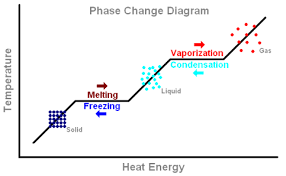Phase Changes in Public Opinion
Ars Technica » Scientific Method 2019-05-16

You might think that the public’s view of an issue – climate change for instance – would evolve continuously as events occur and information becomes available. That often may be the case, but sometimes public opinion can change relatively quickly. A prime example is the legitimacy of same-sex marriage, which went from being a weird, unacceptable idea to the conventional wisdom in only a few years.
One way to think about these changes is to think about the way that matter changes phase, from solid to liquid or liquid to gas. Think about a cube of ice that’s just below the freezing point. Warm it just a little and it goes from being a hard rigid solid to being completely fluid. There’s no intermediate stage between solid and liquid – the ice cube doesn’t turn gooey or stretchy before it falls apart completely and becomes water. Instead, it flips quickly from one stable form(solid) to another (liquid). If you think about an individual molecule of H2O, it’s kept in place within the crystal lattice by the molecules around it, and they in turn are kept in place by it and the other molecules surrounding each of them. Once molecules start peeling off, the forces holding the other molecules weaken and they in turn peel off – a true snowball effect.
What does this have to do with environmental law? Purely in. terms of science, phase changes are much like tipping points. On one side of the tipping point, the world is in one stable state (or at least on one stable trajectory). But if the worlds gets pushed past the tipping point, it flips over to another stable state (or stable trajectory). But there’s also an analogy to climate politics.
Here’s the connection. As Yale’s Dan Kahan explained in an interview in Yale360, there’s a kind of logic to the psychology of climate change denial: “You don’t have to be a rocket scientist or a climate scientist to do that with respect to climate change because it’s really obvious what position your group has.” In other words, people deny the reality or cause or seriousness of climate change primarily because that’s what others in their group do. This can be a very stable equilibrium, resistant to change. Kahan gives the example of what happened to a conservative stalwart who became worried about climate change: ‘”You know, Bob Inglis, the congressman from South Carolina, he was like the Babe Ruth of conservative political ratings. Nobody did better than he did [in ratings from conservative groups] across all the issues that normally determine whether you are a conservative in good standing. And then one day he says, ‘Well, I’m concerned about climate change and what impact that could have on my constituents and other people in the country.’ Soon after that, he is out of office because he is defeated in the primary.”
Just as each water molecule is held in place by the network of molecules around it, so climate denialists cling to their beliefs because that’s what everyone around them – the members of their group – believe. Just as water as two phases, so does this kind of belief system: either no one in the group believes in climate change or everyone in the group believes in climate change. As Bob Inglis found out, there’s no intermediate state. This means that the group’s views are very stable: people will stick with climate denial things get to a certain point and then they all change their views fairly quickly.
So obviously, there are limits to this analogy. People aren’t molecules; they form their beliefs in more complicated ways. Young people with different backgrounds and experiences join the group, while old people drop out. And communication between people is a lot more complex than the bonds between water molecules. But the analogy does suggest that we could see periods of surprisingly rapid change in opinion after periods of stubborn resistance to an idea. In the case of climate change that could be very good news. It’s hard to make good policy or even have healthy public debate when a third of the population won’t acknowledge reality.